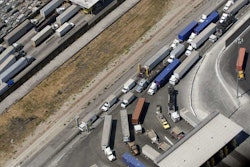Last year the broker trade group called it a "fraud apocalypse." This year, the Federal Motor Carrier Safety Administration called freight fraud "a public safety crisis," and with about $800 billion in losses annually, if the shoe fits, wear it.
Avenues for fraudsters toward identity theft in trucking are legion, and there's plenty to do to avoid falling victim, especially in the fast-paced spot market. But aside from dedicated freight fraudsters, there's an entire class of nine-to-five criminals working overseas to pilfer passwords and login credentials from any and all comers and then to package and sell them on the "dark web."
That's according to John Williamson, VP of sales at SOCRadar, a cyber intelligence firm that's partnered with DAT to fight cyber threats -- Williamson spoke at the Mid-America Trucking Show in late March.
 SOCRadar VP of Sales John Williamson traced the route of cyber crime to double brokering at MATS.
SOCRadar VP of Sales John Williamson traced the route of cyber crime to double brokering at MATS.
DAT sees plenty of cyber threats, hacks and bad actors come its way as the biggest load board in the country. Williamson said it's "common wisdom" to think big actors like DAT, or perhaps Amazon, might be targeted by cyber criminals, but the truth is, today, "probably everyone in this room is being targeted."

[Related: 'Iluminati' hack hits DAT boards with thousands of $20/mile postings]
Not only is cyber crime now your problem as an owner-op, it's getting worse thanks to AI, too, he said.
"Basically what’s happening is [criminals are] using AI agents in order to imitate legit companies," he said. The fraudsters might use "AI-enabled concepts" to "register a whole host of imitating domains that look awfully similar" to the real deal. The bad guy's AI can create email addresses, generate email headers and even profiles of employees that "very much mimic their style conversationally."
The methods vary, but the goal remains the same: To "mimic and fool people into clicking things they shouldn't click into." Stay vigilant for imitations like emails from [email protected] or [email protected]. These types of cheap tricks have been around for a long time, but criminals continue to step their game up, according to Williamson. He likened the level of cyber theft trade craft to "someone showing up at your house in a UPS truck in a UPS uniform with a scanner getting you to sign for something and then walking away," only it wasn't UPS at all, but a hard-working crook.
[Related: Freight markets, fraud, predatory towing, pay-to-park: Small-biz trucking challenges]
Why would someone work so hard to knock over a small trucking business? Aren't the Amazons of the world more attractive?
Williamson said people who work in the supply chain, like truckers and their broker friends, are under "a lot of pressure and moving very quickly," while also using "legacy systems" that rely on old, outdated technology, which now the big companies want to move onto mobile apps. Using a credit card over a smartphone has become widespread as "tech is becoming extremely distributed," he added. There are now "several doors" for criminals to knock on, and "essentially easy money for bad actors."
Importantly, the person who scams you doesn't even have to take the further risk of emptying your bank account or playing with your data. Williamson said there's a dark web site called "Russian Black Market" where scammers post batches of credentials for sale.
[Related: FMCSA calls fraud a 'public safety crisis' in tech-focused MATS talk]
"There are about 40,000 sets of credentials hitting the dark web every single day," he said. "What happens is a booming black market for those credentials."
Williamson's company, SOCRadar, monitors the dark web to "find the mentions of any domain that happens to have credentials that have been exfiltrated," which are normally sold in bundles of "a couple thousand credentials."
Guess how much a few thousand sets of credentials costs? About $10, said Williamson.
"We set it up so we can track these things. You just give us your domain, and we'll tell you the minute one [of your credentials] goes for sale," he said.
At that point, SOCRadar will, on your behalf if you like, take the path of least resistance. "We’ll just go buy it," he said. "There's a button on our site where we convert cash to bitcoin" and it simply takes your credentials off the dark web while alerting you to change passwords and lock down computers.
"Not saying it won't show up" on the dark web again, he added, but the company can get individual caches of credentials taken down.
Williamson said DAT has done hundreds of "takedowns" of exfiltrated credentials on the dark web, but that the cyber threats against a big platform like DAT remains a "volumetric problem."
[Related: Part of anti-fraud bid, FMCSA to introduce new 'one-stop shop' for all carrier business]
 SOCRadar offers a free edition of its cybersecurity product to any interested business, which includes basic incident alerts, scans for compromised credentials on the dark web, and IP and phishing monitoring.
SOCRadar offers a free edition of its cybersecurity product to any interested business, which includes basic incident alerts, scans for compromised credentials on the dark web, and IP and phishing monitoring.
"The only input information the platform needs is the main domain address of your business," according to terms on SOCRadar's website. "Upon subscribing the platform, in an hour, SOCRadar discovers your internet-facing digital assets including domains, IP addresses, SSL certificates, websites, employees’ email addresses, network services, applications etc."
In an increasingly difficult market, maybe simply taking the step to monitor your fleet's cyber security could give you a leg up in sales efforts to shippers and brokers. After all, they're worried about cyber crime too, and having your account in their system compromised could lead to more fraud they have to deal with.
[Related: Owner-op jailed after unwitting participation in cargo theft: Cautionary tale, mitigating risk]










